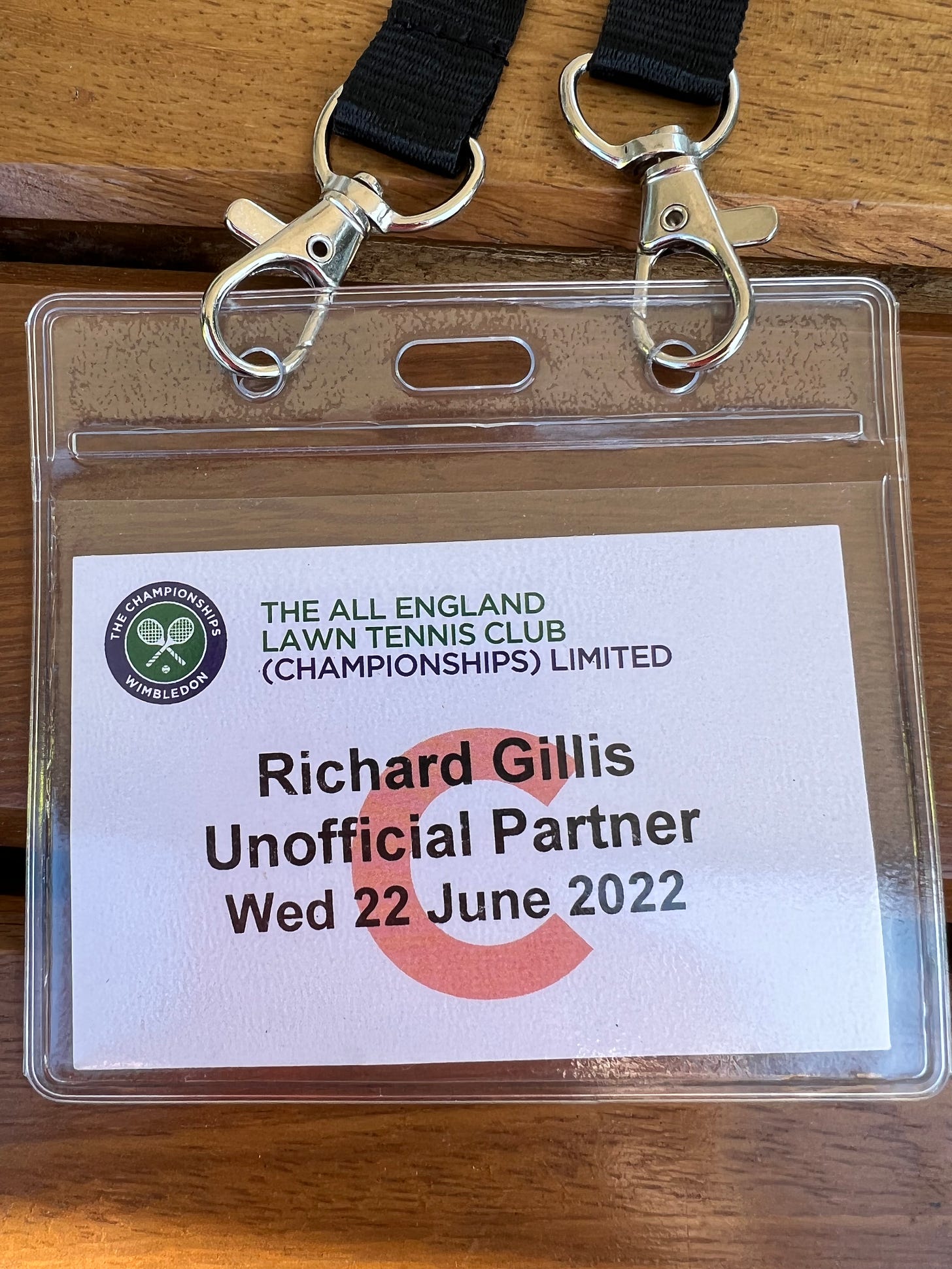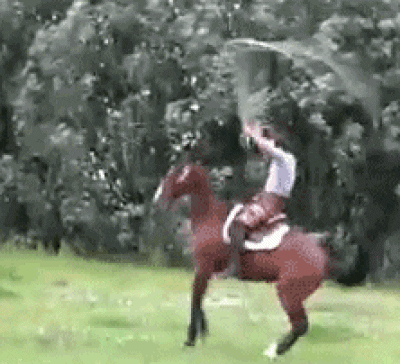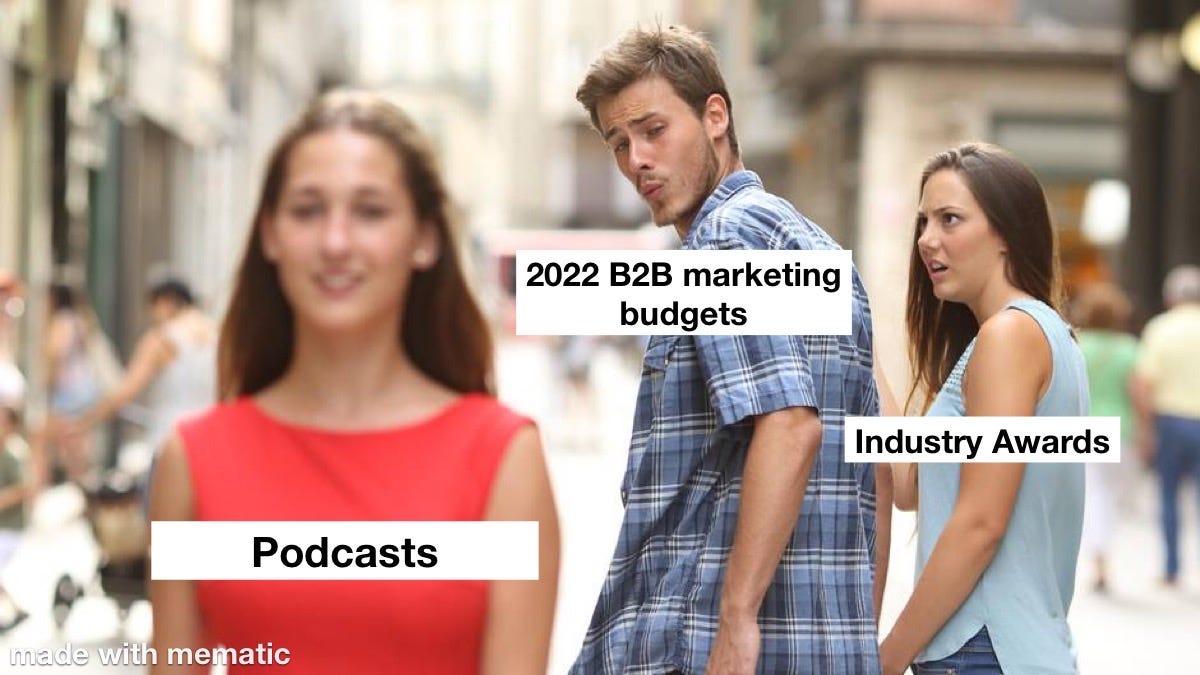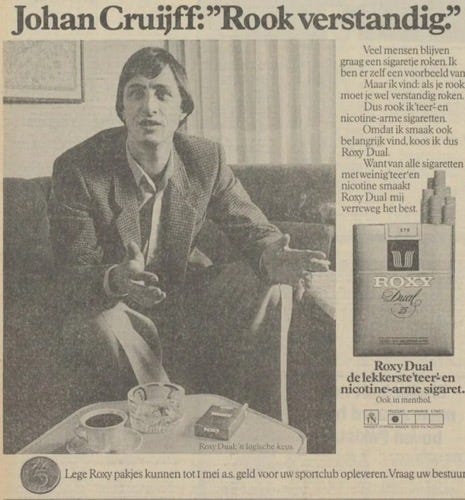UP in SW19; Grass, tennis, Osaka and conformity; Laporta's stalking horse rides again; Adidas AI patent drop; Sportsbiz bubble stories; When the CMO goes rogue; StepUP to Voiceworks
Overthinking the sports business, for money
Never forget: Our listeners are your clients
UP goes to SW19
We went to Wimbledon yesterday to see Alex Willis, communications and marketing director, (her last Championships before heading to the Premier League) and Jamie Baker, Wimbledon tournament director and head of player relations.
Podcast is out tomorrow. It’s really good.

The pressure to conform: Grass, homogeneity and the conservatism of so-called athlete activists
A couple of years ago, Wimbledon started buying other grass court tennis tournaments, notably in Germany and Spain.
Why?
Because grass is the brand.
Beyond all the strawberries and Pimms cliches, the playing surface is Wimbledon’s point of difference: Tradition; sophistication; premium.
People who know about tennis say it’s a faster, more exciting form of the game which is hard to master.
To prosper, Wimbledon needs the best players to peak over the next fortnight.
To enable this, they’ve wrapped their arms around the grass court season to quality control the run-in to their own event.
This is smart longer term thinking by one of the best run organisations in world sport.
See also: Slams Assemble, why the ranking points reward consistency over excellence and reveal how tennis really works.
See also: Beware the siren call of tennis rights
Grass as battleground (this is a bit of a stretch, but bear with me)
Jamie Baker is at the nexus between the players and the event: not straightforward given the current hostility between the ATP/WTA and Wimbledon re Russian and Belarusian players and the docking of world ranking points from this year’s event.
Naomi Osaka is an influential voice and she doesn’t love grass.
The former world number 1 is currently ranked 38 (you’d think she’d want to play down the importance of world rankings…).
Her Grand Slam success has come on artificial hard courts at the US Open and Australian Open.
She has never progressed past the third round on the slower clay courts of Roland Garros or the faster grass of Wimbledon.
A central part of tennis’ folklore is that the great players must conquer every surface.
“I would love to go just to get some experience on grass, but at the same time, for me, it’s kind of – I don’t want to say pointless, no pun intended,” she said. “But I’m the type of player that gets motivated by seeing my ranking go up.”
Osaka is often hailed as a maverick activist.
She’s started her own agency, Evolve, with her agent Stuart Duguid, formerly IMG.
The mood music is of radical outsider-ism.
But when it comes to the actual tennis, she’s surprisingly conservative reflecting the majority view of ATP/WTA membership who prefer a homogenised calendar of hard court tournaments.
This is the problem of giving the players too much control: They move to the middle.
We, the punters, prefer to see them struggle beyond their comfort zone - see also golf.
In fact, Wimbledon’s grass is, I learnt yesterday, slowing down.
The 2022 surface is ‘more neutral’ says Jamie Baker, than the 1992 vintage.
This has already made Wimbledon more accessible to the generalists at the expense of the specialist fast court players of yore.
This is a shame, because slower courts make the tennis calendar more uniform, less nuanced and less interesting.
Final point: if I was running Osaka’s new agency, I’d re-position her antipathy to Wimbledon as eco activism - the next wars will be fought over water, green grass is a luxury none of us can afford etc.
Concreting over Centre Court would do two jobs: add a valuable new dimension to her personal brand, and give her a chance of getting through the first week.
See also, Why The Masters is selling a dangerous green dream.
Plus: Beware the siren call of tennis: CVC and the long shadow of ISL
Differentiation pt2 - Barcelona’s stalking horse
Joan Laporta’s long term brand strategy leaves a bit to be desired.
Barcelona used to be distinctive.
Now they’re just like all the rest, just with added sanctimony.
Sponsorship helps tell the story.
The red and blue shirt was famously free of corporate logos until 2006, when Joan Laporta ‘broke with tradition’ and gave it to UNICEF, which normalised the idea of a shirt sponsor with the Barca membership and was later replaced with Qatar Airlines.
Now Laporta is back in charge, and the stalking horse* is getting another ride.

UNICEF has gone.
A new charity is on the back of the shirt.
I give it a year before it’s replaced with a betting brand.
Differentiation pt2 - Adidas’ patent drop
My new favourite Substack newsletter is Patent Drop.
It’s a really simple idea. Every week, there’s a summary of 3 new patents from big tech companies and a wider list of all patents from these companies.
Patents are a great way of getting a peek into the future before it’s been built and released.
Here’s something Adidas are working on behind the scenes: Personalisation at scale.
Adidas are exploring using AI to improve the algorithm for converting the input data into manufactured shoes. The filing mentions that they would train their model on user feedback data - using both qualitative feedback, as well as sensor data. The next wave of production will be leveraging AI to create personalised products, in a way that’s as cost & time-efficient as mass-production.
Sportsbiz Bubble stories
An occasional list of topics that obsess people in the sports business but which have virtually no traction with real people.
I’ll go first:
The MLS.
How to win a Cannes Lion
In 2019, Cannes Lions launched a sports specific category - hear UP175 .
The head of the judging panel for the awards was Ben Hartmann, chief client officer for Octagon.
We talked about the criteria the panel of ten judges used to judge the work and we chose our favourites from the short list.
It’s a conversation about creativity in a sports marketing context, and much more besides, from the role of agencies, whether sponsorship helps or hinders creativity and the threads that are common to the very best work.
Vintage
I’m a sucker for old ads.
Here’s Johan Cruyff flogging fags.
Protecting the brand from the CMO
A question that came up in last week’s podcast with Celine Del Genes from Adidas, UP251.
We don’t often talk about the personal, careerist element to sport sponsorship.
This is particularly true of people who come in to a big brand job and want to leave a mark.
In advertising terms, there’s a limit to the damage that a bad CMO can cause.
They could sign off on a crap campaign, or change the logo, both of which can be undone later on.
Sponsorship is a slower moving thing, particularly long running partnerships such as those between say, Adidas and Coca-Cola with the IOC or FIFA, which have run for decades.
I’ve always wondered how these relationships endure the revolving door in the C suite.
Ricardo Fort, formerly of Visa and Coke, heard the podcast and got in touch:
A big sponsor usually has its own mechanisms and structure or processes (i.e.: the board, investors' relations, public affairs, etc.) to protect itself against the stupidity of any individual manager.
This is why no good and big company will terminate a long standing deal just because a new CEO, CMO, CFO, etc. doesn't like it.
The same is not as common when it comes to signing new deals. Any new C_ _ (fill the blank) can come and sign a new and expensive contract.
This is because a new contract is always positive until (years later) it is proven a mistake. A contract termination - on the other hand - is almost always immediately visible if it goes wrong.
No manager becomes famous for terminating deals. Almost everyone does for signing a new one.
The Job: Director of Commercial Partnerships, Voiceworks Sport
The Blurb: Voiceworks Sport are leaders in voice technology and audio solutions for sport across the globe. We work with rights holders, sports specialist agencies & brands and commercialise premium sport podcasts.
We own and operate the UK’s largest sport podcast network (Sport Social) which hosts some of the biggest names in sport podcasting providing a highly targeted audience for advertisers.
We are looking for a Director of Commercial Partnerships – Sport who will be responsible for growing revenue from rights holder projects, working on sponsor funded sport audio projects and winning key partner sponsors for premier podcast shows on the Sport Social Podcast Network
The Link: Director of Commercial Partnerships
If you’re looking for talent and want to use this spot, get in touch with Sean@UnofficialPartner.co.uk









